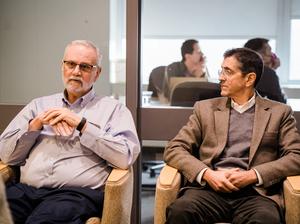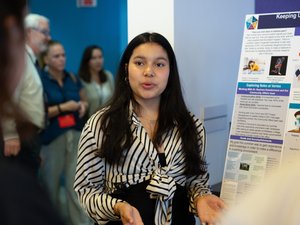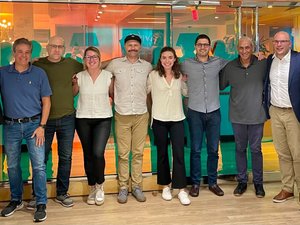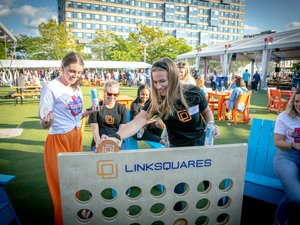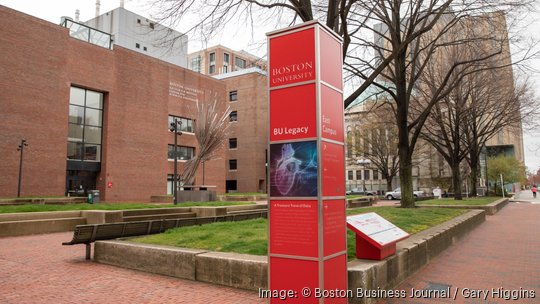
Behind the scenes at Boston University, researchers are working on such products as an AI-driven therapeutic device that could help people restore their walk after a stroke and a new process to restore enamel directly on the surface of a tooth.
Innovations like these are taking a step closer to commercialization thanks to funding from the university.
On Tuesday Boston University announced that it was awarding $75,000 each to eight professor-led research projects through its Ignition Awards. The researchers come from across Boston University and will receive funding, as well as coaching and support, to help bring their product to market.
"This is a critical program that helps our researchers take an important step forward with an idea that has the potential to change the world for the better,” Rana Gupta, BU’s director of faculty entrepreneurship, said in a statement to BostInno.
BU Technology Development runs the proposal and review process for the Ignition Awards. The Ignition Review Committee, which is composed of outside industry experts and BU academics, selects a group of finalists and makes funding recommendations.
- Sign up for The Beat, BostInno’s free daily innovation newsletter from BostInno reporter Hannah Green. See past examples here.
The Ignition Awards recipients use the new funding and support to hit milestones such as generating compelling data, showing proof-of-concept or creating a prototype.
“Ignition Awards endeavor to identify and support market-worthy ideas through funding as well as education, coaching, and support. Researchers emerge from the program with a better, more nuanced understanding of the potential for their idea to be commercialized and with a clearer picture of what they need to do next to turn their concept into a product that can help real people,” Gupta said.
In the past, recipients have gone on to launch companies like Clade Therapeutics, which is developing a stem-cell treatment for cancer, and Sol Clarity, a company with a water-free system for cleaning solar panels.
Meet the winners of this year’s Ignition Awards. The following descriptions have been provided by Boston University:
- Yuwei Fan, a BU Henry M. Goldman School of Dental Medicine research associate professor of restorative sciences and biomaterials, developed a new process that could restore enamel directly on the surface of a tooth, replacing any loss. The technique relies on a special formula that deposits enamel-structured materials onto the damaged tooth surface. Fan, who’s also a research operations director, has already tested the process in the lab in conditions that simulate the human mouth environment, and will use the Ignition Award to move the technology closer to clinical trials.
- Lou Awad, a College of Health & Rehabilitation Sciences: Sargent College associate professor of physical therapy, and his lab have developed a new AI-driven therapeutic device that could help people restore their walk after a stroke. This wearable device, called reNeu, can stimulate and contract calf muscles, which help lift and lower a patient’s foot, generating nerve activity that strengthens the parts of the brain responsible for those movements.
- Weining Lu, MD, a Chobanian & Avedisian School of Medicine associate professor of medicine, pathology, and laboratory medicine, has discovered that kidneys and eyes share a common genetic signaling pathway called ROBO—and blocking that pathway could treat disease in both organs. Many kidney and retina disorders are caused by the growth of abnormal blood vessels that can leak, swell, and form scar tissue, he says, and manipulating ROBO may slow or stop those vessels from growing, halting the progression of disease.
- Mark Grinstaff, the university’s inaugural Distinguished Professor of Translational Research, and Wilson Wong, BU College of Engineering associate professor of biomedical engineering, are developing a new way to coax these modified immune cells, called CAR T-cells, into attacking their targets for longer periods and with greater levels of intensity. By introducing a specialized RNA molecule into T-cells, the researchers force the cells to express more cancer-targeting proteins on their surface, making them more likely to find and destroy tumors.
- Béla Suki, an ENG professor of biomedical engineering, has developed a new device, called AccuStretch, that may solve the problem of the difficulty to test new respiratory drugs in the lab. The device mounts precision-cut lung tissue from organ donors onto a flexible membrane that constantly stretches and relaxes, mimicking real breaths. He has also created a new way to measure the stiffness of the tissue, another key component of lung disease.
- Ignaty Leshchiner, a Chobanian & Avedisian associate professor of computational medicine, is developing a simple blood test that can show cancer activity almost immediately. Many fast-growing tumors shed cells into the bloodstream, he says, and with simple DNA sequencing techniques, it is possible to flag elements of those cells’ mutated DNA, providing a rapid, low-cost diagnostic for a variety of cancers.
- Hank Fien, the Nancy H. Roberts Professor of Educational Innovation at BU Wheelock College of Education & Human Development, is creating an AI-enhanced digital platform for teaching and assessing reading skills. The new system provides game-like lessons on a web interface or mobile device. As students play through these lessons, the AI-backed software immediately identifies the skills they need to improve, provides more lessons that reinforce those skills, and flags those areas for teachers so they can provide individualized attention.
- Vijaya Kolachalama, an associate professor of medicine and computer science at the BU Faculty of Computing & Data Sciences and Chobanian & Avedisian School of Medicine, has developed an innovative AI-powered solution. Leveraging medical data, imaging, and clinical tests, his software can pinpoint specific forms of dementia even before significant symptoms manifest. This enables healthcare professionals to tailor precise therapies and interventions.
